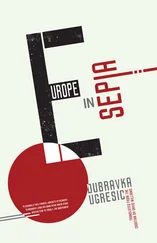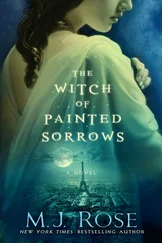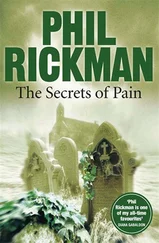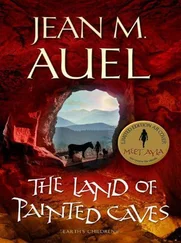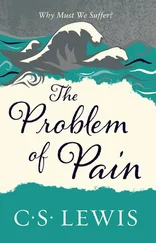A sudden chill drew me out of my comatose state, and I pushed my way over to the phone. But once there I fell apart again and froze for a while. Then I somehow managed to get the receiver off the phone, dial 112 and grunt my address into the mouthpiece. When a policeman appeared at the door a while later and saw me handcuffed to the chair, saw the three stripes of congealed blood on my right wrist, and smelled the urine, I read something I could identify with in his glance. Something came together with something at that moment, and I finally made the connection: the policeman was observing me with the look I had used to observe the girl in the clearing.
Igor was right. I won’t forget him. Nor will he forget me; of that I am certain. Because I could have kept his name from the policeman, but I didn’t. What is more, I accused him of rape, and for breaking and entering and rape he would, I presume, get several years and a criminal record that would hound him the rest of his life. If I hadn’t done it, he wouldn’t have remembered me. I did it so he would. I had sown my seed. I was a teacher, wasn’t I?
There is no such thing as mercy, no such thing as compassion; there is only forgetting; there is only humiliation and the pain of endless memory. That is the lesson we brought with us from the country we came from, and it is a lesson we have not forgotten. Screaming and shouting are like Pavlov’s bell to us; we are deaf to everything else. Catching the scent of terror is child’s play to us; nothing tickles our nostrils more.
The natural bracelet of the three small incisions on my right wrist and the acrid odor of urine were the invisible handcuffs that would bind us, me and my pupil. I saw my future self making a newly acquired gesture, a kind of tic I would long be unable to shake off. It consisted of bringing the mouth down to the wrist, slowly pressing the lips to the three thin stripes and kissing them — Igor’s stamp, Igor’s brand — then tracing them with the tip of the tongue, testing whether they were still there, and finally raising the wrist slowly and holding it up to the light so that the stripes, now moist with saliva, glistened like mother-of-pearl.
Humpty Dumpty sat on a wall.
Humpty Dumpty had a great fall.
All the King’s horses and all the King’s men
Couldn’t put Humpty together again.
I was plaguedby nightmares at the beginning of the war and again when Goran and I left Zagreb. They had the same structure and were connected with a house. The house always had two sides to it: a front and a back. The front I knew; the back I came to know as I dreamed. The back was a false bottom, leaping out at me like a jack-in-the-box and thumbing its nose. In the dream I would come across a door, a set of stairs, or a passageway that would lead me to a parallel part of the house whose existence I had never suspected, or else I would discover that the house was partly floating, like the proverbial castles in air. I would move a shelf away from a wall and find a large hole with a gale of a wind rushing through it or no wall at all, and I looked out to see the house dangling on a thin, frayed wire.
Parallel spaces in my dreams inevitably portended monstrous grimaces, malicious warnings. The dreams came like sudden gusts of wind. They were followed by periods of calm, then started up again with renewed force. But eventually they petered out and ceased altogether.
In time they wound together into a single skein, and I put them aside. All but one, that is, which I made it my business to remember. The house in that dream was something of a labyrinth. It had several levels and was made of a number of incongruous materials. The roof was so high it seemed more suitable to a church. Suddenly I noticed that the roof was swelling into the shape of something like a funnel, and before I knew it the roof burst and what should come down through the “funnel” but a stream of books. It began the size of a trickle of grain but ended up an avalanche, pages hurtling through an air thick with book dust. Goran wasn’t there, but I could see Mother on the other side of the room staring up at the ceiling in amazement. I ran over to her and grabbed her by the hand, and the two of us ran out into the street just before it collapsed like a house of cards.
“The key!” Mother screamed. “Have you got the key?”
“No, I haven’t,” I said with a pang of guilt, yet perfectly aware of how ridiculous her concern was: what good is a key without a house?
“Well, now we haven’t even got a key,” she said in despair.
Geert and Ana’s flat consisted of a living room, a bedroom, a tiny kitchen with a balcony, a narrow hallway, and a tiny bathroom. There was a television set and a pile of videos on a low table in the living room and a half-dead rubber plant next to the television set. There was a bookshelf with a few books against one wall and an old couch with a grimy, faded slipcover against the other. The wall above the couch was decorated with an upbeat but beaten-up Dušan Petriši  poster, a map of Belgrade in its Yugoslav heyday. On the table with the videos I found Ana’s list of instructions: the numbers of the phone and gas companies, the location of the stopcock, and so on. The carpeting in the living room was mud-stained and threadbare, the wallpaper in tatters, the windows curtainless and cloudy. The blinds were covered with a thick layer of dust.
poster, a map of Belgrade in its Yugoslav heyday. On the table with the videos I found Ana’s list of instructions: the numbers of the phone and gas companies, the location of the stopcock, and so on. The carpeting in the living room was mud-stained and threadbare, the wallpaper in tatters, the windows curtainless and cloudy. The blinds were covered with a thick layer of dust.
Without giving the matter much thought, I went out and bought a variety of detergents and all sorts of scrub brushes and sponges. I began with the bedroom. Everything that could be turned upside down I turned upside down. I washed the windows and door. I swabbed the wardrobe with alcohol to get rid of the stale odor. I gave the blinds an alcohol rub as well. I vacuumed everything, walls included. Then I hung my clothes in the wardrobe and made the beds with the freshly washed linen I’d brought with me. The bedroom was now tolerable. One room down.
Next I gathered up the rubbish. I threw out a pile of newspapers, all the leftover food, and some cracked dishes. I tore down the poster from the living room wall and emptied the bathroom of everything that wasn’t cemented in place. I put it all into black plastic bags, which I put out by the front door. I would haul them downstairs in the morning. I then gave the bathroom a thorough going-over. I filled the medicine chest with my own cosmetics and adorned the sink with a porcelain soap-dish I’d picked up somewhere. Once the bathroom felt more or less presentable, I took a shower, fell dead-tired into bed, and slept the night through.
The next day I launched into the kitchen. I spent a great deal of time and energy removing stains from the cabinets, fridge, stove, tiles, windows, and door. Despite my aching wrists I proceeded to the living room. I vacuumed the walls, carpet, and couch and did my best to beat the unpleasant smell out of the latter two, after which I attacked them with a wire brush and cleaning fluid. Because the wallpaper was hopelessly filthy, I went out and bought some paintbrushes, a can of paint, and a ladder. I spent the next two days covering the wallpaper, which was luckily the kind that can be painted over, with a thin layer of white paint. The place was beginning to look better now, but the freshly painted walls only pointed up the grayish cast of the woodwork. So I sanded it all down and sealed it with a white oil-based paint. That took another two or three days.
Then I started shopping in earnest. I found a nice grayish-white bedspread, and once I’d draped it over the couch, put a lamp I’d purchased earlier on the table, filled a vase with fresh flowers, and hung a solidly framed poster of the Louis Hine black-and-white photo of workers perched high up on a beam during the construction of the Empire State Building and smoking away, the living room became livable. True, it was still very much a “student pad,” but that didn’t bother me in the least.
Читать дальше
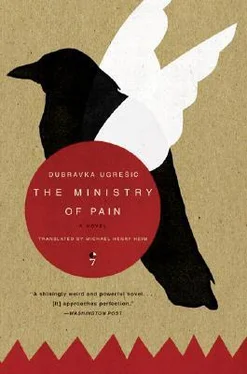
 poster, a map of Belgrade in its Yugoslav heyday. On the table with the videos I found Ana’s list of instructions: the numbers of the phone and gas companies, the location of the stopcock, and so on. The carpeting in the living room was mud-stained and threadbare, the wallpaper in tatters, the windows curtainless and cloudy. The blinds were covered with a thick layer of dust.
poster, a map of Belgrade in its Yugoslav heyday. On the table with the videos I found Ana’s list of instructions: the numbers of the phone and gas companies, the location of the stopcock, and so on. The carpeting in the living room was mud-stained and threadbare, the wallpaper in tatters, the windows curtainless and cloudy. The blinds were covered with a thick layer of dust.
